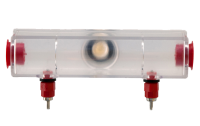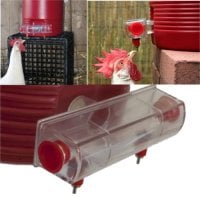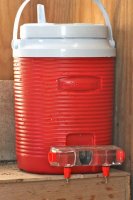- Jun 28, 2011
- 39,160
- 27,425
- 1,302
Nine ways to help prevent parasites in your flock
Taking proactive steps to minimize internal parasites is easier than treating sick birds.
Taking proactive steps to minimize internal parasites is easier than treating sick birds.
Lancaster, Pa. [May XX, 2017] – Do you find yourself throwing away eggs after treating your flock for internal parasites? Although it’s nearly impossible to keep your chickens completely worm-free year-round, proper management can help prevent parasite issues in your flock.
Why should you care about worms in your birds?
Worm, or parasite, infestations can cause poor growth, decreased egg production and in severe cases, death. Internal parasites can also make a flock more susceptible to diseases or make existing diseases worse.
Backyard birds can easily ingest internal parasite eggs while scratching the ground and foraging for bugs, including snails, slugs, grasshoppers, ants and earthworms. Insects can also harbour parasite eggs, which infect your birds when ingested.
If your birds are not behaving normally and seem distant from the rest of the flock, it could be a sign of parasites causing illness. Pay close attention to your birds for additional symptoms of internal parasites:
Appetite loss
Weight loss
Watery droppings
Dehydration
Hens stop laying
Separation from the rest of the flock
Balance and coordination loss due to weakness
Poor feather quality
Dull combs, wattles and eyes
1 Tellez, G., Pixley, C., Wolfenden, R.E., Layton, S.L., Hargis, B.M., 2011. Probiotics/direct fed microbials for
Salmonella control in poultry. Food Research International. 45(2012):628-633.
While parasite infections can be serious, being proactive can help prevent parasites from ever
becoming an issue. Here are nine ways to help keep your birds happy, healthy and parasite-free:
1. Avoid overcrowding – Give birds plenty of room to be comfortable. Overcrowding can cause an abundance of germs in a small area.
2. Clean coops at least once a week – Cleaning and adding fresh bedding prevents infected droppings from accumulating.
3. Avoid introducing infested chickens to the flock – Purchase your chickens as newborn
chicks. If you purchase adult birds, quarantine them for a minimum of two weeks to monitor their health and assess for potential disease and parasite symptoms. 2
4. Avoid giving feed or treats on the ground – Ground pecking for feed and treats increases
the risk of your flock consuming parasitic bugs and encountering droppings from contaminated birds.
5. Keep chickens off freshly tilled ground – Chickens love to eat bugs and freshly tilled ground turns up insects possibly hosting parasite eggs. Keeping your flock away from freshly tilled areas can help limit their exposure to an overabundance of tasty bugs.
6. Keep wild birds away from your flock – Wild birds could be infected with parasites and shed parasite eggs through their droppings.
7. Use integrated pest management (IPM) practices to control insect populations – IPM practices are an eco-friendly way to eliminate or control factors required for pests to survive.
8. Test and sanitize drinking water – One sick bird can infect the rest of the flock simply by contaminating the waterers. Test and sanitise the water, and keep waterers and feeders cleaned to help control or reduce the chance of spreading infection.
9. Target worms – Use an all-natural supplement to help breakdown the natural defences of intestinal worms and their eggs. This makes parasites more susceptible to attack by the bird’s immune system, stomach acids and bacteria in the gut.
Naturally preventing diseases before they start is the best strategy to support the immune system of your birds, prevent expensive, time-consuming veterinarian visits and maintain a happy, healthy flock. For more information about poultry health, visit http://www.dbcagproducts.com and “like” the HealthyFlock Face Book page.
2 Agriculture Victoria. 2011. Quarantine advice for small poultry flocks. [Accessed April 24, 2017].
http://agriculture.vic.gov.au/agric...ry/quarantine-advice-for-small-poultry-flocks
DBC Ag Products delivers innovative, natural solutions that target intestinal health to overcome animal agriculture’s toughest challenges. Its unique, proprietary formulas focus on the optimal combination of new and proven technologies to prevent disease, save animals, improve feed utilization and deliver profitable results to customers. The Backyard Chicken® Health Pack, including Zyfend® A, has been successfully used for over 30 years in daily heath programs at modern operations, including organic-certified and natural-certified production systems.




 Great advice
Great advice





